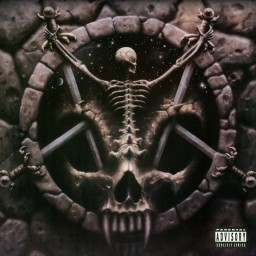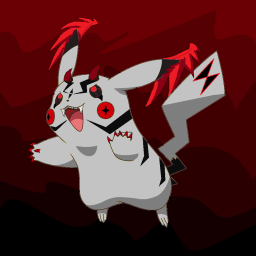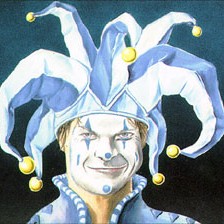Reviews list for Slayer - Divine Intervention (1994)
Divine Intervention has remained not only my favorite slayer album, but my favorite album of all time since I heard it in my freshman year of high school, 2010. Not that it immediately became my favorite album upon first listen – no, this is a slow grower, but a very easy album to come back to. And come back to it I did, many times; I’m sure this is in my top 10 most listened albums of all time, and a certain contender for the #1 spot.
But, why Divine Intervention?
Why the album AFTER Slayer stopped being the greatest Thrash band in the world? After the lineup change and the death of metal in the 90’s? The album with troubled production and almost no live representation?
Quite frankly, because I don’t give a damn about any of that stuff.
I speak with utmost sincerity when I say I think this album is absolutely as great in every department as the 5 preceding it. The only exception being that the production is lower quality, but you know what? That higher class sheen on Seasons in the Abyss never did it for me as much as the raw, honest sound that we get here. The complaints about the production quality are completely unfounded if one enjoys Show No Mercy, or Kill ‘Em All, or basically any Black Metal.
With sufficient clarity on why none of this album’s “weaknesses” bother me, let me now express why I love it so much.
The mood. The atmosphere. The writing. Slayer were always that too evil band that were somehow mainstream. From day one they were writing about Satan, demons and infernal hellfire, and they remained consistent in that approach throughout the 80’s, with growing themes of real horrors as well, including war and mental illness. However, on Divine Intervention, hell froze over. The hell fire faded and the demons gave way to a much more terrifying being – humanity. Strongly influenced by literature about serial killers as well as newspaper articles, Tom Araya took a stronger writing role here and focused almost exclusively on real world evil and suffering. Songs took a deeper look into the psych of serial killers, criminals, and even drug abuse on the closing “Mind Control.” The riffs followed suit, and as such, this album isn’t as flashy as their previous material, and I think that gets lost on a lot of people. The riffs here are cold and calculated, evoking sincere darkness and an unrelenting bleakness that remains consistent throughout the entire album.
Which leads to an immense strength of this album; the songwriting. Hints of Tech Thrash break through in many of the tracks here, with less conventional rhythms courtesy of Paul Bostaph taking the songs into twisting territory that deviates far from their simpler punk roots. The guitar solos on this album are actually good, and more often than not add to the song with more thoughtful melodies as opposed to pure chaos. The title track and closing track both have perhaps the best solos by the band, and truly these songs felt like they had gained a level of maturity and depth in their structure. Tom’s vocals are also the most aggressive, manic and eclectic he has ever laid to record; in title track “Divine Intervention” he pushes his yelling to its limit, and haunting “Serenity in Murder” allows his lower registry to croon wickedly between more thrash roars. Divine Intervention could easily be argued to be Slayer’s heaviest album, which cannot be said for most metal releases from bands that were “declining” in the 90’s.
At the risk of sounding crazy, I’ll also confess that the insanely dark lyricism and mood on this album, particularly on tracks like “Killing Fields,” were immensely helpful for me emotionally. Since I discovered it, Metal has always been an extremely cathartic way for me to deal with negative emotions. Divine Intervention did that better than any other album I’d heard, and still remains one of my weapons of choice when I need it. People don’t usually label Slayer as being emotional music, but they probably forget that anger is an emotion. Some people have their OK Computers, some people have their Dark Side of the Moons, and I’ve got my Divine Intervention.
Production issues and some underwhelming tracks set Divine Intervention as a marker for the decline of Slayer.
From the mid-eighties through to the early nineties, it appeared Slayer could do no wrong. With two widely considered thrash metal masterpieces (Reign in Blood and Seasons in the Abyss) and one of the finest live albums ever produced (Decade of Aggression), the Americans were riding high as arguably to kings of metal. Even their lesser praised works such as Hell Awaits and South of Heaven held more quality tracks than the majority of the field could even dream of. Yet beneath the veneer of success internal conflict was brewing. After eleven years of stability, the legendary Slayer line-up was broken when Dave Lombardo quit due to conflicts with other members of the band. Things came to a head when Lombardo stated his wish to stay with his wife to witness the birth of his child, only to receive constant pressure from Kerry King to tour instead. Given that the band had nine months to work their touring schedule around Lombardo’s request, he rejected King’s demands and quit. Straight after the birth, Lombardo would form Grip Inc. with Voodoocult guitarist Waldemar Sorychta, but in the meantime, Slayer had recruited former Forbidden drummer Paul Bostaph to fit his seriously big shoes. It would be two more years before Slayer would be ready to record their first album without the classic line-up, and unfortunately their woes were set to continue.
It’s not completely clear what happened during the recording of the band’s sixth full length album, but there’s no doubt that it was an experience they’d like to forget. The ironically titled Divine Intervention faced so many problems that the recording was eventually split over a few separate studios, including Oceanway in Los Angeles and Sound City in Van Nuys. Bostaph seems to be the band member that suffered the most from this turmoil and has since stated that the already daunting prospect of playing drums for one of metal’s elite bands was made infinitely harder by an inexperienced producer that knew nothing about metal, and his performance being recorded in vastly different environments. When the album was released on September the 27th 1994, it sold over 95000 copies in its first week and received some solid reviews, but long-term fans picked up straight away that something wasn’t as it should be. The production just doesn’t have the punch that their previous albums contain and most tellingly, given the emphasis that riffs hold in Slayer’s music, the rhythm section is really low in the mix. Even some of the most exhilarating sections of the album fall short of the impact normally associated with their work. On the other hand, the leads jump out at the listener, being far louder and clearer than the riffs, leaving the underbelly seeming limp.
From start to finish, Divine Intervention is undeniably Slayer, still leaving most of the thrash metal competition for dead, but it simply fails to leave a lasting impression the way the band’s material normally does. One of my personal gripes with the album is Araya’s vocal effort, which sounds much more forced than it had to this point. He’s always ripped through lyric sheets like he’s desperate to get to the end, but here it comes across as unnatural and at times grating. On the positive side, while most fans were preparing themselves for Bostaph to fall short of Lombardo’s inimitable brilliance, if you ignore the production issues his first-up effort is very impressive. He managed to summon Lombardo when necessary to achieve that Slayer riff-percussion combo that works so well, but he brought his own character to proceedings with great results. As for highlights, the short burst tracks such as Sex.Murder.Art, Dittohead and Serenity in Murder still kick serious ass and both Killing Fields and 213 overcome all the apparent problems to stand out as fantastic Slayer moments. The rest is underwhelming if not disastrous, leaving Divine Intervention as a decent yet disappointing album that unfortunately ended the golden Slayer era. They’d never really recover either, which makes this album somewhat of a negative experience all up.


 SilentScream213
SilentScream213
 Ben
Ben